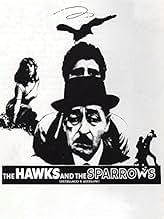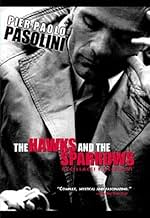AVALIAÇÃO DA IMDb
7,2/10
5,8 mil
SUA AVALIAÇÃO
Adicionar um enredo no seu idiomaTotò and his son Ninetto are drifting on a road in Italy when they meet a speaking crow.Totò and his son Ninetto are drifting on a road in Italy when they meet a speaking crow.Totò and his son Ninetto are drifting on a road in Italy when they meet a speaking crow.
- Prêmios
- 4 vitórias e 4 indicações no total
Totò
- Totò Innocenti
- (as Toto')
- …
Ninetto Davoli
- Ninetto Innocenti
- (as Davoli Ninetto)
- …
Nello Appodia
- Party Guest
- (não creditado)
Gabriele Baldini
- Dante's Dentist
- (não creditado)
Pietro Davoli
- Mascalzone
- (não creditado)
Rossana Di Rocco
- Ninetto's Girlfriend
- (não creditado)
Enredo
Você sabia?
- CuriosidadesFilm's opening credits are not only displayed on screen but also comically sung in Italian to a jaunty Ennio Morricone score, with a memorably droll rhyming of the film title with the director's full name.
- Cenas durante ou pós-créditosThe opening credits are performed as a song.
- ConexõesEdited into Histoire(s) du cinéma: Une histoire seule (1989)
- Trilhas sonorasUccellacci E Uccellini (Titoli Di Testa)
Composed by Ennio Morricone and Pier Paolo Pasolini
Performed by Domenico Modugno
Avaliação em destaque
"Where goes humanity?" - "I don't know!" Maybe it's a comedy, but I don't think anyone is 100% sure what kind of a film this really is. It's not really comedic, because behind all those absurdities and silliness there lies a seriously political and religious concern, a bittersweet desire and infallible disappointment. Maybe we should take the film as what it is, as one-of-a-kind, a cinematic high jump which gives rise to all sorts of speculation and conjectures without knowing where to start and where it ends.
Not only the viewer is left unsure, the protagonists are, too. They embody the condition of the film's unsureness perfectly, as well as the nature of one of the most unique works of Italian cinema, which is also the most variant and formally abstract film project of Pasolini: A weird story, a picaresque tale which mixes metaphors and cinematic references (from Keaton's statics to Chaplin's poesy of the dusty road to Fellini's clowns to Rossellini's monks); a philosophic apology which depicts the end of ideologies, the crisis of Marxism on the background of the clash of rulers and subjects (hawks and sparrows) and the unfortunate encounter of those who have the blessing of knowledge (the wise raven) and those who outlive themselves without the awareness of being part of this world: Totò and Ninetto, father and son. Both are walking the eternal road of a universe which is merciless, discuss pretentious things and express themselves with the help of their basic instincts: physical needs, but also the hate towards inferiors and subservience to superiors. On their way, they encounter the mystery of life and death (birth of a child, a family that kills themselves with gas, a funeral), as well as the mortal fear of those who starve. Until the raven appears, decides to go along with them and overwhelms them with needless wisdoms.
It's great to see Totò in here, a masterful actor who often was criminally misused in abysmal Italian entertainment movies and shows here the wide range of his talent. The interaction with the young, intuitive Ninetto Davoli is probably the biggest joy in this film.
Not only the viewer is left unsure, the protagonists are, too. They embody the condition of the film's unsureness perfectly, as well as the nature of one of the most unique works of Italian cinema, which is also the most variant and formally abstract film project of Pasolini: A weird story, a picaresque tale which mixes metaphors and cinematic references (from Keaton's statics to Chaplin's poesy of the dusty road to Fellini's clowns to Rossellini's monks); a philosophic apology which depicts the end of ideologies, the crisis of Marxism on the background of the clash of rulers and subjects (hawks and sparrows) and the unfortunate encounter of those who have the blessing of knowledge (the wise raven) and those who outlive themselves without the awareness of being part of this world: Totò and Ninetto, father and son. Both are walking the eternal road of a universe which is merciless, discuss pretentious things and express themselves with the help of their basic instincts: physical needs, but also the hate towards inferiors and subservience to superiors. On their way, they encounter the mystery of life and death (birth of a child, a family that kills themselves with gas, a funeral), as well as the mortal fear of those who starve. Until the raven appears, decides to go along with them and overwhelms them with needless wisdoms.
It's great to see Totò in here, a masterful actor who often was criminally misused in abysmal Italian entertainment movies and shows here the wide range of his talent. The interaction with the young, intuitive Ninetto Davoli is probably the biggest joy in this film.
- spoilsbury_toast_girl
- 1 de nov. de 2008
- Link permanente
Principais escolhas
Faça login para avaliar e ver a lista de recomendações personalizadas
- How long is The Hawks and the Sparrows?Fornecido pela Alexa
Detalhes
Bilheteria
- Faturamento bruto mundial
- US$ 3.348
- Tempo de duração1 hora 29 minutos
- Cor
- Mixagem de som
- Proporção
- 1.85 : 1
Contribua para esta página
Sugerir uma alteração ou adicionar conteúdo ausente

Principal brecha
By what name was Gaviões e Passarinhos (1966) officially released in India in English?
Responda






























